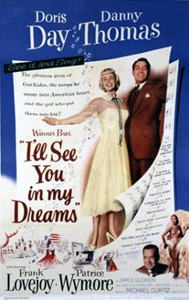I'll See You in My Dreams (1951 film)
| I'll See You in My Dreams | |
|---|---|
 Theatrical release poster | |
| Directed by | Michael Curtiz |
| Screenplay by | Jack Rose Melville Shavelson |
| Based on | The Gus Kahn Story book by Louis F. Edelman Grace Kahn |
| Produced by | Louis F. Edelman |
| Starring | Doris Day Danny Thomas Frank Lovejoy Patrice Wymore James Gleason |
| Cinematography | Ted D. McCord |
| Edited by | Owen Marks |
| Music by | Gus Kahn |
| Distributed by | Warner Bros. |
Release date |
|
Running time | 110 minutes |
| Country | United States |
| Language | English |
| Box office | $2.9 million (US rentals)[1] |
I'll See You in My Dreams is a 1951 musical film starring Doris Day and Danny Thomas, directed by Michael Curtiz.
The film is a biography of lyricist Gus Kahn, and includes a number of songs written by Kahn, including the title song. The story, which thoroughly suppresses Kahn's Jewish origins, is told from the point of view of Kahn's wife Grace, who was still alive when the film was made (Kahn died some ten years earlier). I'll See You in My Dreams was a big hit, Warner Brothers' second-highest-grossing film of 1952. Warner Brothers re-teamed Curtiz and Thomas in another project: the 25th-anniversary remake of the first talking film, The Jazz Singer (1927), with Thomas in the Al Jolson role, The Jazz Singer.[2]
Plot summary
This section needs expansion. You can help by adding to it. (March 2013) |
Gus Kahn (Danny Thomas) is the prolific tunesmith, whose fortunes take an upswing in 1908 when he meets and falls in love with Grace LeBoy (Doris Day). Kahn's career ascends to spectacular heights via such hits as "Pretty Baby", "My Buddy", "Toot, Toot, Tootsie", and "Makin' Whoopee", only to go into eclipse when he loses his savings in the 1929 stock-market crash.[3]
Cast
- Doris Day as Grace LeBoy Kahn
- Danny Thomas as Gus Kahn
- Frank Lovejoy as Walter Donaldson
- Patrice Wymore as Gloria Knight (singing voice was dubbed by Bonnie Lou Williams)
- James Gleason as Fred Thompson
- Mary Wickes as Anna
- Julie Oshins as Johnny Martin
- Jim Backus as Sam Harris
- Minna Gombell as Mrs. LeBoy
- Harry Antrim as Mr. LeBoy
- William Forrest as Florenz Ziegfeld, Jr.
- Bunny Lewbel as Irene, at age 6
- Robert Lyden as Donald, at age 8
- Mimi Gibson as Irene, at age 3
- Christopher Olsen as Donald, at age 4 (as Christy Olson)
- Joan Vohs as Chorine (uncredited)
Notes
An album of the same name was released by Columbia Records, containing songs sung by Day (some of them duets with Thomas) in the film.
The film has been cited by Berry Gordy as an inspiration for his start in songwriting. [4]
References
- ^ 'Top Box-Office Hits of 1952', Variety, January 7, 1953
- ^ http://www.tcm.com/tcmdb/title/78986/I-ll-See-You-In-My-Dreams/articles.html
- ^ http://www.allmovie.com/movie/ill-see-you-in-my-dreams-v24172
- ^ Nelson George, 'Where did our love go', p. 18
External links
- 1951 films
- 1950s biographical films
- 1951 musical comedy films
- American biographical films
- American films
- American musical comedy films
- Biographical films about musicians
- American black-and-white films
- English-language films
- Films about composers
- Films directed by Michael Curtiz
- Warner Bros. films
- Cultural depictions of classical musicians
